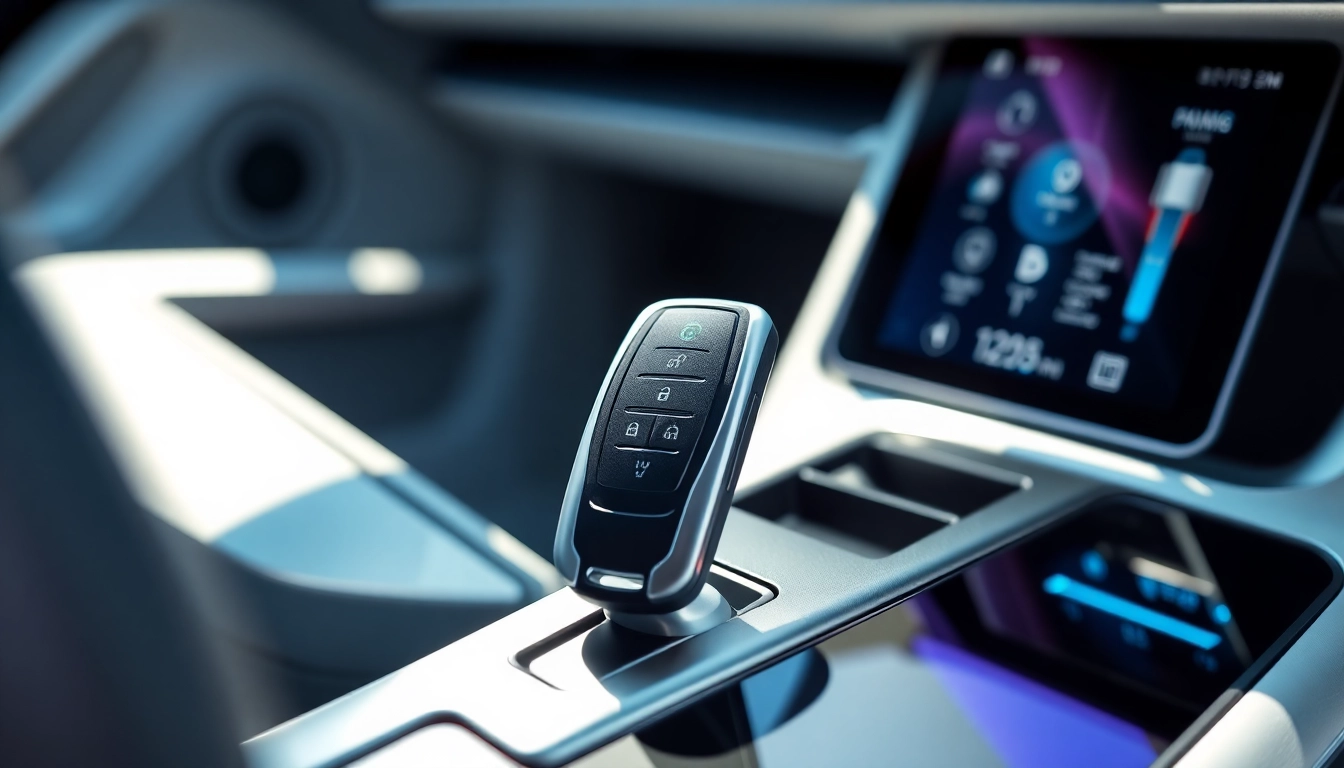Introduction to Keys for Electric Cars
As electric vehicles (EVs) gain popularity, understanding the types and functionalities of their keys has become increasingly important. The evolution from traditional mechanical keys to advanced smart keys and digital systems reflects broader trends in automotive technology. This article explores the nuances of Keys for electric cars, examining their types, features, security aspects, and future innovations.
Overview of Electric Vehicle Technology
Electric vehicles operate using an electric motor instead of a traditional internal combustion engine. This transition drastically changes vehicle operation and ownership experiences, including how vehicles are accessed and started. Modern EVs often employ sophisticated key systems designed for convenience, security, and integration with user technology, such as smartphones. Understanding the technology behind these keys requires a closer look at how they enable vehicle interaction and contribute to an overall seamless user experience.
Types of Keys for Electric Cars
The types of keys utilized in electric cars range from conventional key fobs to cutting-edge digital keys that leverage smartphone technology. Below are the primary types:
- Traditional Key Fobs: These remote devices are often equipped with buttons for locking, unlocking, and starting the vehicle. While still common, they are increasingly supplemented or replaced by more advanced systems.
- Smart Keys: Smart keys provide a keyless entry system, allowing drivers to unlock their vehicles by simply approaching with the fob in their pocket or handbag. This technology improves convenience significantly.
- Digital Keys: This emerging technology allows the use of smartphones as keys. Using near-field communication (NFC) or Bluetooth, drivers can lock, unlock, and start their vehicles via smartphone apps, eliminating the need for physical keys.
- Remote Start Systems: Many modern electric vehicles offer advanced key fobs that allow the driver to start the vehicle from a distance, providing comfort by pre-conditioning the cabin before entry.
Importance of Keys in Modern EVs
The role of keys in electric vehicles extends beyond simple access; they are a vital part of the user experience. Efficient key systems enhance convenience and security, streaming the interaction between the driver and their vehicle. Moreover, as the automotive industry pivots towards greater connectivity and automation, the key’s function will continue to evolve. Manufacturers are continually innovating to incorporate advanced tracking and security features into their key systems, reflecting the growing emphasis on secure personal data and vehicle accessibility.
Features of Keys for Electric Cars
Key Technologies and Their Benefits
The technology integrated into keys for electric cars is vastly different from traditional key technology. The benefits of these advancements include:
- Enhanced Security: Modern keys often incorporate encrypted signals and anti-theft features, making unauthorized access significantly more difficult.
- Convenience: Smartphone integration allows users to manage various vehicle functions from their phones. This includes unlocking doors, monitoring battery levels, and even scheduling charging sessions.
- Customization: Many smart key systems allow users to personalize settings, including seat positions, climate controls, and infotainment preferences, making driving more tailored to individual needs.
- Remote Capabilities: The ability to start the vehicle remotely means drivers can prepare their cars for use even before they reach them, enhancing comfort and usability.
Comparing Traditional and Modern Keys
A critical aspect of modern electric cars is the contrast between traditional keys and the new generation of smart keys. Traditional key fobs serve a basic purpose—they unlock and start the vehicle. In contrast, modern keys integrate various technologies that offer extensive functionalities:
- Remote Access: Unlike traditional keys that required insertion into a door or ignition, modern keys often allow for far-reaching access and control.
- Battery Notifications: Many smart keys offer notifications for battery life, enabling proactive maintenance of both the key and the vehicle.
- Mobile App Integration: Modern key systems can be paired with apps that provide comprehensive insights into vehicle performance and diagnostics.
Future Innovations in Key Design
The future of keys for electric cars looks promising as technology continues evolving. Anticipated innovations include:
- Biometric Access: Keys that utilize fingerprint or facial recognition could further enhance security and personalization, adding another layer of authentication.
- Blockchain Technology: Using blockchain for vehicle access can ensure secure data transfer and improve anti-theft measures.
- Seamless Integration with Smart City Infrastructure: Finding solutions that allow for keys to interact with broader city systems, such as parking management and traffic control, could revolutionize urban transportation.
Security Aspects of Keys for Electric Cars
Understanding EV Key Security Protocols
Security is a primary concern when it comes to vehicle keys, particularly with the advanced technologies involved in electric vehicles. Key security protocols are designed to protect against unauthorized access and potential threats:
- Encrypted Signals: Most modern keys utilize encrypted signals to transmit data between the key and the vehicle, significantly reducing the risk of hacking.
- Rolling Codes: Key fobs often utilize rolling codes that change each time the key is used, making it difficult for interceptors to clone the signal.
- Secure Storage: Digital keys may be stored in secure parts of smartphones, leveraging the device’s built-in security features, including complex passwords and biometric authentication.
Common Security Challenges with Electric Keys
While technology enhances security, it can also introduce new challenges. Some common issues include:
- Signal Interception: Despite advancements, some key fobs are still susceptible to signal interception, allowing thieves to capture and replicate the signals.
- Battery Dependency: The functionality of smart keys relies heavily on battery life; if the battery fails, access to the vehicle can be compromised.
- Portability Risks: As more users rely on smartphones as keys, losing a device can lead to immediate access risks.
Best Practices for Protecting Your Key
To mitigate risks associated with electric vehicle keys, adopting best practices is crucial:
- Regular Maintenance: Ensure that the key fob’s battery is regularly checked and replaced as needed.
- Secure Storage: When not in use, store smart keys away from doors or windows to reduce the risk of signal interception.
- Awareness of Surroundings: Be vigilant when using keys, especially in crowded or unfamiliar locations, to protect against unauthorized access.
Handing Key Fobs for Electric Cars
Programming and Customization Options
Key fobs for electric cars often come with sophisticated programming features that allow customization based on individual preferences. This might include setting specific driving profiles, managing access for multiple users, or programming remote start capabilities. Users can typically modify these settings through dedicated apps or on-board vehicle interfaces.
Battery Life and Maintenance Tips
Maintaining battery health is critical for the functionality of key fobs. Here are several tips to extend battery life:
- Avoid Frequent Use: While it may be tempting to frequently utilize remote features, reducing activation can extend battery life.
- Replacement: If your key fob requires a battery replacement, consult the vehicle manual for appropriate methods, ensuring it’s done correctly to avoid damage.
- Store Safely: Keep the key fob in a protective case to guard against physical damage, which can lead to malfunctions.
Replacement Keys and Their Costs
The costs associated with replacing keys, particularly for electric cars, can vary significantly based on technology and features. Typical expenses may include:
- Standard Fob Replacement: These typically range in price based on the model of the vehicle, but drivers should factor in programming costs as well.
- Smart Key Replacement: As these keys are more complex, replacement costs can be higher, and it is often necessary to consult a dealer or specialist.
- Insurance Considerations: Some car insurance policies offer coverage for key replacements, making it wise for owners to review their policies.
Conclusion: The Future of Keys for Electric Cars
Innovations on the Horizon
As technology evolves, the keys for electric cars are likely to see numerous innovations. Expect advancements in security, personalization, and integration with smart home technology. The automotive industry is poised to explore further connections that keys can have with both drivers and the digital landscape.
Consumer Adoption Trends
The adoption of advanced key systems is largely influenced by consumer demand for convenience and security. With the increasing popularity of electric vehicles, consumers expect innovative and reliable key solutions that enhance their driving experience.
Impact on the Electric Vehicle Market
As the market for electric vehicles continues to expand, the evolution of keys will play a pivotal role. The integration of advanced key technologies can serve as a unique selling proposition, attracting tech-savvy consumers looking for enhanced functionality and security in their driving experience.



